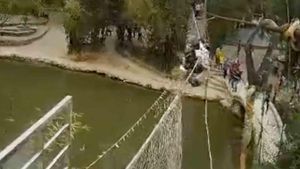Residents of Devenishkes, a village located near the Belarus border in Lithuania, face persistent challenges from stray cows, bulls, and sheep. For nearly 20 years, these free-roaming animals have caused disruptions to village life and agricultural activities. With complaints regularly received about the damage they inflict and the fear they instill, local authorities are now scrambling to find solutions.
The Shalychininkai municipality has been aware of the issue for years. According to LRT.lt, the local administration has attempted to control the situation by building pens for the animals; unfortunately, the pen stands empty, with government efforts to engage with the animals' owner yielding little success. Stanislav Wojciechowski, the acting head of the public order department, stated, "We organized and installed the pen so it would be easier to catch and transport them." Yet, these efforts have yet to bear fruit.
Compounding the problem, the animals’ owner, who refuses to care for them properly, regards them as part of his family. This sentiment has led to resistance to any governmental intervention aimed at rehoming the animals. Farmers nearby, led by individuals like Yaroslav Shikno, have reported extensive damage to their crops. Shikno explained the dire consequences: "We process about 80 hectares, and these animals cause damage on around 40 hectares, leading to losses of 40-50 tons of harvest." Such losses are not just statistics but represent real economic strains on local farming operations.
Local farmers frequently encounter these hefty animals, which often wander more than three kilometers from their registered home. Shikno mentioned, "We’ve faced instances where 700-kilogram bulls come right up to our yards. It can be quite frightening for people—especially when you’re simply trying to tend to your daily activities!" Residents have witnessed the bulls grazing dangerously close to homes, igniting anxiety every time they step outside.
Reports suggest the situation has intensified, with Wojciechowski noting, "Problems began when residents started complaining about these animals, especially the bulls, entering the village and seeking grass." Farmers have turned to local authorities and even the police numerous times, but the outcome often feels ineffectual. Reasons cited include bureaucracy, the owner’s denial of responsibility, and the apparent dismissive attitude of local officials.
During the hunt for solutions, cooperation between the municipality and the local populace is being emphasized as key. Unfortunately, local farmers are unwilling to adopt any of the animals after discovering their owner. They seem hesitant to step onto what they view as land fraught with potential complications. Wojciechowski noted, "We visit the owner nearly every day, bringing him feed and helping negotiate sales. So far, there’ve been no takers."
This has left many villagers feeling trapped, unsure of how to reclaim their lives from these wandering creatures.
Attempts by authorities to manage the burgeoning situation have noticeably heightened since April of the previous year. Prior to these efforts, residents reported living among aggressive animals with little to no governmental action. The empty pen serves as the only visible initiative the local government has undertaken, highlighting the struggle of ensuring community safety against formidable livestock.
Nevertheless, community members remain hopeful. Officials are exploring avenues for cooperation with the State Food and Veterinary Service to find long-term resolutions. Local farmers are also being rallied for their participation, marking the emergence of collective engagement as they work together to restore peace to their village.
The scene today is one of uncertainty, but it is also one of potential, as the people of Devenishkes strive to reclaim control over their agricultural livelihood and neighborhood peace. The challenges posed by stray cows, bulls, and sheep signify more than animal management; they reflect the broader attempt of local communities to coexist with and regulate their environment effectively.



